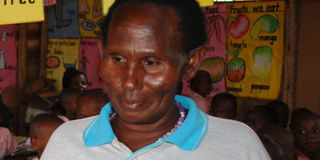She dedicated her life to grooming toddlers

Polly Nakaweesi says she does not find teaching other pupils as fulfilling as teaching toddlers. Photo by Christopher Kisekka
Although they are not normally credited, nursery teachers play a significant role in grooming children into responsible citizens and also laying a foundation for later stages of growth and development, especially in learning.
Imagine finding yourself dealing with children crawling under desks, requesting for items x, y and z, throwing papers around, constant trips to the toilet, as others cry for reasons you can hardly tell.
Such is what Polly Nakaweesi, fondly called aunt Polly by those who have gone through her hands, has had for the last 36 years. However, she still finds joy in what appears to be a ‘hectic’ job.
“You cannot imagine how a day in a nursery class looks like. If I leave you there for 30 minutes you may get out crying or leaving every one of them crying. Very many people think we do not do much sadly,” she says.
Born 62 years ago at Kayanja Village, Kitanda Sub-county in Bukomansimbi District, a cheery Nakaweesi believes she was born to mentor innocent souls.
“Since my childhood, I wanted to be a teacher. I admired my niece Cathy Nakabugo,” Nakaweesi said, adding, “I always enjoyed the role of miss (teacher) as we played at home. I thought a teacher was a special creature.” And to pursue her dream, she joined Bishop Stuart Primary Teachers’ College in Mbarara District in 1979, after her primary education in Kitanda Primary School, Bukomansimbi District in 1978, where she spent four years training as a Grade Two teacher.
She later upgraded to Grade III teacher at Itojo Primary Teachers’ College in Ntungamo District between 1985 and 1987.
Between 1987 and 1990, she taught in her former primary school.
After a few years, in 1994, Nakaweesi moved to Masaka Town in search for greener pastures and was welcomed by a number of schools, including Baptist Primary School, St. Denis Infant School and Hope Primary School.
“A man called Lubega Zaake came looking for me. I had taught her children some years back and he thought I was the best recruit in his new school, Hope Primary School,” she reminiscences.
Nakaweesi taught at the school for nearly 15 years and she won over pupils and parents alike marking the period as her ‘silver’ moment.
Short break
In 2010, Nakaweesi took a bold decision to retire from service and ventured into farming. In the same year, Kitovu Parish started a kindergarten and nursery school and the parish priest, Fr Henry Kasule, asked her to head the new school. However, she declined the opportunity.
Many parents who knew her love and care for children were irked by her decision to retire and thus advised her to start up a nursery and daycare centre.
“I had to rethink my decision but had no money to embark on the nursery project. They [parents] looked for a suitable place, paid rent and also mobilised for learners,” she noted.
With only 12 learners, Nakaweesi started Aunt Polly Nursery School in 2012 which has since developed to admit primary pupils. “This school is a perfect reflection of my entire years of practice. I make sure that learners get only the best, because that is my legacy,” she asserts.
The passionate teacher feels proud meeting her former pupils. “Many have grown up to be successful people but cannot forget me.”
Caring for the young
Nakaweesi stresses that to teach toddlers, one needs to build their trust and get to their level to make them learn.
“Children are funny. When one says they want to go to the toilet, suddenly everyone will want to. Certainly many will be using it as an excuse to leave the classroom,” she says. She advises teachers of infants to set rules for nearly everything. “For example the rule of time; there is time for playing, sleeping, eating and studying. No one can compromise on that unless they are sick or something else,” she says.
Asked how else one can effectively teach toddlers, the 62-year-old says the best method is playing, acting and using visible examples. She strongly discourages cram work, and talk-and-chalk methods.
“Not everybody was born bright and not everybody can learn at the same pace as the other. Teachers ought to learn how to handle children at an individual level,” Nakaweesi says.
But how could this be in class where there are more than 30 or even 50 learners? To her it is as simple as teaching ABC.
“Creating groups of quick learners, moderate and the slow learners is one of the many effective methods we can employ. Good teachers know how to practically do it,” she said.
But the seasoned nursery teacher condemns the use of abusive language and corporal punishments, saying this directly affects child development and have long term effects on the learner’s schooling and social-emotional adjustments.




